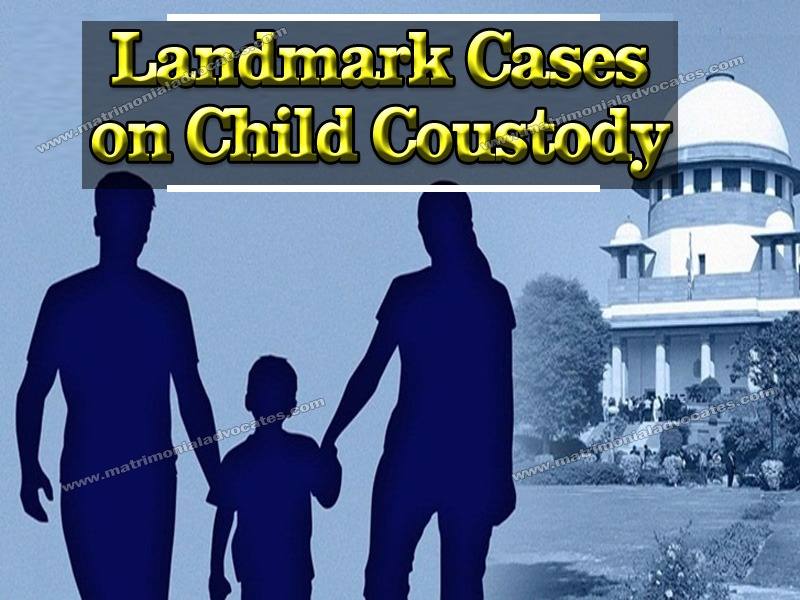
CASELAWS IN INDIA ON CHILD ABDUCTION :
As India is still not a signatory to Hague Convection on Child abduction, the courts respects the principle of ‘comity of courts’ and welfare of the child.
1. In Mrs. Elizabeth Dinshaw v. Arvand M. Dinshaw and Another8, this Court held that it was the duty of courts in all countries to see that a parent doing wrong by removing children out of the country does not gain any advantage by his or her wrongdoing.
2. Nithya Anand Raghavan vs State Of Nct Of Delhi on 3 July, 2017
32.” In this connection, it is necessary to refer to the Hague Convention of 1980 on “Civil Aspects of International Child Abduction”. As of today, about 45 countries are parties to this Convention. India is not yet a signatory. Under the Convention, any child below 16 years who had been “wrongfully” removed or retained in another contracting State, could be returned back to the country from which the child had been removed, by application to a central authority. Under Article 16 of the Convention, if in the process, the issue goes before a court, the Convention prohibits the court from going into the merits of the welfare of the child. Article 12 requires the child to be sent back, but if a period of more than one year has lapsed from the date of removal to the date of commencement of the proceedings before the court, the child would still be returned unless it is demonstrated that the child is now settled in its new environment. Article 12 is subject to Article 13 and a return could be refused if it would expose the child to physical or psychological harm or otherwise place the child in an intolerable position or if the child is quite mature and objects to its return. In England, these aspects are covered by the Child Abduction and Custody Act, 1985.”
3. Dr. V. Ravi Chandran Vs. Union of India & Ors 2010 (1) SCC 174,
13…… “The sudden and unauthorized removal of children from one country to another is far too frequent nowadays, and as it seems to me it is the duty of all courts in all countries to do all they can to ensure that the wrongdoer does not gain an advantage by his wrongdoing.”
16…. “The modern theory of Conflict of Laws recognises and, in any event, prefers the jurisdiction of the State which has the most intimate contact with the issues arising in the case. Jurisdiction is not attracted by the operation or creation of fortuitous circumstances such as the circumstance as to where the child, whose custody is in issue, is brought or for the time being lodged. To allow the assumption of jurisdiction by another State in such circumstances will only result in encouraging forum-shopping.
4. Smt. Ayeesha M. Torgal Vs. Sri B. Pradeep Muthukumar passed by High Court of Karanataka at Bangalore
10. “In the instant case the child was born at Belgium and in the custody of the parents. The father filed a petition for divorce. Apprehending the mother may take away the child to India, he moved the Court at Belgium for restraining the mother from taking the child out of Belgium and an order came to be passed. It is thereafter she left Belgium to India. Subsequently an order of divorce came to be passed. Under these circumstances, no blame could be put on the doors of the husband. Therefore in the facts and circumstances of this case, it is not possible to accept the aforesaid interpretation. The Court at Bangalore where the wife is residing presented the petition has no jurisdiction. The child has not seen India at all or born in India. He was born at Belgium, residing at Belgium on the date of presenting the petition. Therefore, the finding of the Family Court that it is has no jurisdiction to entertain the petition is legal and valid and it does not call for interference.”
5. Indra vs B.G.Giri passed by Madras High Court on 1/12/2015
47 “……….. Before deciding the question as to whether the custody should be given to the mother or the father or partially to one and partially to the other, the High Court must i)take into account the wishes of the child concerned and ii)assess the psychological impact, if any, on the change in custody after obtaining opinion of a child Psychiatrist or a child welfare worker. If a court of Law finds that it is just and proper that the custody of children may be transferred from one parent to the other that can be made under provisions of Section 26 of the Hindu Marriage Act, 1955 itself, as per decision Sangeeta V. Sanjai @ Babla [2006 (4) AWC at page 3344 and 3346 (All.)]”
49. “ ……….Since the welfare of the child is paramount consideration in deciding the custody of the child and even though the Respondent/Husband is the natural guardian of the minor child according to the relevant provision contained in Hindu Minority and Guardianship Act, 1956, r/w.Guardianship and Wards Act, 1890, this Court considering the welfare of the minor and also taking note of the fact that the child is taking treatment for his learning disability is of the considered opinion that the interest of the minor child would be well served and taken care of by the Respondent/Husband (father) if the custody of the child is ordered to be given to him. Moreover, even regard to custody, maintenance and education of the minor child, the Respondent/Husband is a fit person and taking into consideration, this Court holds that the Respondent/Husband is entitled to for the permanent custody of the child. The Respondent/Husband is to take care of the welfare of the minor son Hanuraghav to maintain him, to meet out his educational expenses and to incur necessary medical expenses as the case may be.”
6.Ruchi Majoo V. Sanjeev Majoo AIR 2011
“Section 9 of the Guardian and Wards Act, 1890 makes a specific provision as regards the jurisdiction of the Court to entertain a claim for grant of custody of a minor. While sub-
Section (1) of Section 9 identifies the court competent to pass an order for the custody of the persons of the minor, sub-sections (2) & (3) thereof deal with courts that can be approached for guardianship of the property owned by the minor. Section 9(1) alone is, therefore, relevant for our purpose. It says :
“9. Court having jurisdiction to entertain application – (1) If the
application is with respect to the guardianship of the person of the minor, it
shall be
made to the District Court having Jurisdiction
in the place where the minor ordinarily resides.”
It is
evident from a bare reading of the above that the solitary test for determining
the jurisdiction of the court under Section
9 of
the Act is the `ordinary residence’ of the minor. The expression used is
“Where the minor ordinarily resides”. Now whether the minor is
ordinarily residing at a given place is primarily a question of intention which
in turn is a question of fact. It may at best be a mixed question of law and
fact, but unless the jurisdictional facts are admitted it can never be a pure
question of law, capable of being answered without an enquiry into the factual
aspects of the controversy. The factual aspects relevant to the question of
jurisdiction are not admitted in the instant case. There are serious disputes
on those aspects to which we shall presently refer. We may before doing so
examine the true purpose of the expression `ordinarily resident’ appearing
in Section
9(1) (supra).
This expression has been used in
different contexts and statutes
and has often come up for interpretation. Since liberal interpretation is the first and the foremost rule of interpretation it
would be useful to understand the literal meaning of the two words that
comprise the expression. The word `ordinary’ has been defined by the Black’s
Law Dictionary as follows:
“Ordinary (Adj.) :Regular; usual; normal; common; often recurring; according to established order; settled; customary; reasonable; not characterized by peculiar or unusual circumstances; belonging to, exercised by, or characteristic of, the normal or average individual.”
The word `reside’ has been explained similarly as under:
“Reside: live, dwell, abide, sojourn, stay, remain, lodge. (Western- Knapp Engineering Co. V. Gillbank, C.C.A. Cal., 129 F2d 135, 136.) To settle oneself or a thing in a place, to be stationed, to remain or stay, to dwell permanently or continuously, to have a settled abode for a time, to have one’s residence or domicile; specifically, to be in residence, to have an abiding place, to be present as an element, to inhere as quality, to be vested as a right. (State ex rel. Bowden v. Jensen Mo., 359 S.W.2d 343, 349.)”
In Websters dictionary also the word `reside’ finds a similar meaning, which may be gainfully extracted:
“1. To dwell for a considerable time; to make one’s home; live. 2. To exist as an attribute or quality with in.
3. To be vested: with in”
7. Surya Vadanan Vs. State of Tamil Nadu & Ors. AIR 2015 (SC) 2243,
52. Therefore, we are concerned with two principles in a case such as the present. They are (i) The principle of comity of courts and (ii) The principle of the best interests and the welfare of the child. These principles have been referred to “contrasting principles of law”[32] but they are not ‘contrasting’ in the sense of one being the opposite of the other but they are contrasting in the sense of being different principles that need to be applied in the facts of a given case.





